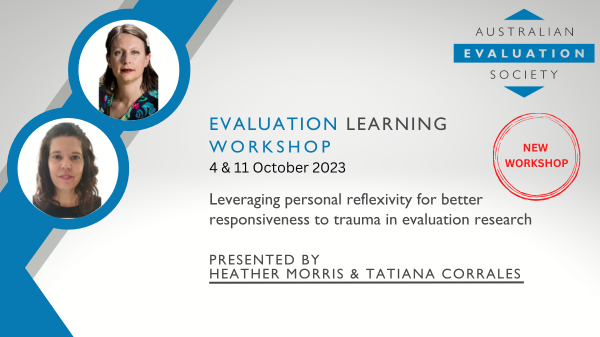Workshop: Leveraging personal reflexivity for better responsiveness to trauma in evaluation research (Online 4 & 11 October 2023)

Workshop: Leveraging personal reflexivity for better engagement, understanding and responsiveness to trauma in research— Key learnings for trauma-informed evaluation
Date and time: Wednesday 4 October & Wednesday 11 October 2023, 10.00am to 1.00pm AEDT (registration from 9.45am) Registrants are to attend both sessions. (full day workshop - 2 sessions)
Venue: Via Zoom. Details will be emailed to registrants just prior to the workshop start time
Facilitators: Dr Heather Morris and Dr Tatiana Corrales
Register online by: 12pm 3 October 2023. Spaces limited to 25 participants
Fees (GST inclusive): Members $295, Organisational member staff $415, Non-members $485, Student member $140, Student non-member $226. Students must send proof of their full-time student status to
About the workshop and workshop purpose
The workshop aims to provide evaluators with an understanding of the multiple ways that trauma impacts evaluation design and implementation. The workshop will focus on three main areas:
1) Understanding trauma amongst research participants
2) Understanding vicarious trauma for evaluators
3) Designing trauma-informed evaluations
Workshop Content
Day 1
-
What is trauma?
-
Common myths about trauma
-
The prevalence of trauma (Adverse Childhood Experiences, cultural trauma)
-
Neurological, physical, and psychological expressions of trauma
-
Distinguishing between ‘types’ of trauma
-
Direct, secondary and vicarious trauma
-
Delineation between secondary trauma/vicarious trauma and compassion fatigue, burnout and Post-Traumatic Stress Disorder
-
Intergenerational trauma and cultural disconnection
-
Trauma in the context of research
-
How trauma can manifest in research/evaluation participants
-
Identifying the signs of trauma among research participants
-
How to manage the impacts of trauma on participants
-
How to create a safe environment for evaluation participants
-
Vicarious trauma for evaluators
-
Factors that contribute to vicarious trauma in research
-
Impact of vicarious trauma on the research process
-
How to manage the impacts of vicarious trauma
Day 2
-
Trauma-informed research and evaluation
-
What is trauma informed research and why is important?
-
Designing a trauma-informed project (e.g., designing appropriate recruitment/ engagement strategies, applying appropriate methodologies, designing rigorous distress and safety protocols)
-
Creating a ‘safe space’ for evaluators, participants and other evaluation stakeholders (e.g., identifying potential triggers for participants and evaluators, developing practical strategies to mitigate/manage triggers)
-
Managing evaluator biases and assumptions grounded in vicarious trauma
Workshop Outcomes
At the completion of the workshop, participants will have an understanding of:
-
Trauma and its impacts on human development, cognition and behaviour
-
The differences between direct, secondary and vicarious trauma
-
The impacts of trauma on research and evaluation
-
The principles of trauma-informed research
PL competencies
This workshop aligns with competencies in the AES Evaluator’s Professional Learning Competency Framework. The identified domains are (please delete non-relevant domains):
-
Domain 1 – Evaluative attitude and professional practice
-
Domain 3 – Culture, stakeholders and context
-
Domain 4 – Research methods and systematic inquiry
-
Domain 6 – Interpersonal skills
-
Domain 7 – Evaluation Activities
Who should attend?
Beginners through to advanced participants will be able to get something out of this workshop.
The workshop will be pitched to all evaluators who have undertaken, or are likely to undertake evaluation projects that include vulnerable populations and/or that explore sensitive topics. There are no pre-requisites for participation.
About the facilitators:
Dr Heather Morris is an Early Career Researcher in the Health and Social Care Unit of the School of Public Health and Preventative Medicine, Monash University. Her research interests include education particularly in early childhood, social care, and implementation science. Dr Morris works with community service organisations that directly engage with vulnerable children and families, to support their service delivery and program outcomes. She uses her expertise in program design, delivery and implementation, qualitative research, and experience-based co-design in her evaluation work to generate change at the individual, organisational and system levels.
Dr Tatiana Corrales is an Early Career Researcher and Research Fellow in the Health and Social Care Unit of the School of Public Health and Preventative Medicine, Monash University. Tatiana has a PhD in Forensic Psychology and has undertaken research in academic and non-academic settings. Her research interests include the intersection of criminal justice and child protection, particularly for pregnant women and new mothers. She has led several projects with vulnerable populations, including young people in Out-of-Home Care, prisoners, and pregnant women with significant child protection concerns. Tatiana has experience in both quantitative and qualitative research methodologies and has overseen the design and implementation of large scale evaluations within the child and family welfare sector.
Workshop start times
-
VIC, NSW, ACT, TAS: 10.00am
-
QLD: 9.00am
-
SA: 9.30am
-
NT: 8.30am
-
WA: 7.00am
-
New Zealand: 12.00pm
For other time zones please go to https://www.timeanddate.com/worldclock/converter.html
Event Information
| Event Date | 04 Oct 2023 10:00am |
| Event End Date | 11 Oct 2023 1:00pm |
| Cut Off Date | 03 Oct 2023 5:00pm |
| Location | Zoom |
| Categories | Online Workshops |
We acknowledge the Australian Aboriginal and Torres Strait Islander peoples of this nation. We acknowledge the Traditional Custodians of the lands in which we conduct our business. We pay our respects to ancestors and Elders, past and present. We are committed to honouring Australian Aboriginal and Torres Strait Islander peoples’ unique cultural and spiritual relationships to the land, waters and seas and their rich contribution to society.
